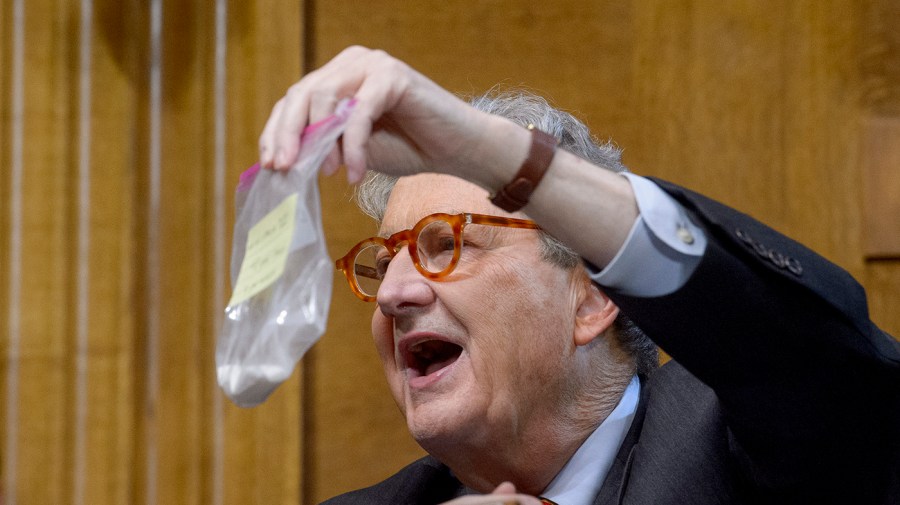House Republicans are moving quickly to pass legislation that would result in harsher sentences for people convicted of fentanyl-related offenses, putting pressure on Democrats who were divided on the bill during the previous Congress.
Leadership on Wednesday teed up the GOP-sponsored HALT Fentanyl Act for a floor vote this week. The bill would permanently classify fentanyl-like substances into Schedule 1, a category reserved for the most dangerous drugs.
“The Halt Fentanyl Act builds on President Trump’s efforts … to secure our border, southern and northern borders, and keep illicit drugs out,” Speaker Mike Johnson (R-La.) said Wednesday during a press conference. “Republicans are taking decisive, strong, and immediate action to rid American communities of this poison.”
Fentanyl-related substances were temporarily classified as Schedule 1 during the first Trump administration and lawmakers have extended the order multiple times.
The same bill passed in 2023 with support from 74 House Democrats, but a majority of the party voted against it, highlighting intraparty divisions.
The Biden administration backed the bill, but it stalled in the Democratic-controlled Senate.
The Senate bill has bipartisan backing, including lead sponsor Sen. Martin Heinrich (D-N.M) as well as Democratic Sens. Maggie Hassan (N.H), Ruben Gallego (Ariz.), Jeanne Shaheen (N.H.) and Mark Kelly (Ariz.), and Sen. Angus King (I-Maine), who caucuses with Democrats.
Still, Democratic lawmakers and public health experts have expressed concern that the bill repeats mistakes from the notorious war on drugs by promoting mass incarceration over prevention, treatment and recovery programs.
Republicans frequently frame the fentanyl crisis in terms of immigration and border security, two areas that were exposed as Democratic weaknesses during the last election.
After winning control of the White House and both chambers of Congress, Republicans are looking to paint Democrats into a corner by supporting a bill they previously opposed, or risk being accused of allowing fentanyl to continue to flood the country and cause more deaths.
Republicans said they hoped more Democrats would vote for the legislation this time. But amid anger over the Trump administration’s dismantling of federal agencies by Elon Musk and his Department of Government Efficiency team, it’s unclear if that will happen.
Rep. Jim McGovern (D-Mass.) said if President Trump were serious about stopping fentanyl, he wouldn’t have pardoned Ross Ulbricht, the founder of the dark web marketplace Silk Road who was convicted of charges including money laundering and drug trafficking.
“You know what would help end the illegal fentanyl problem here? Would have been Donald Trump not pardoning a drug kingpin, essentially, who brought in illegal fentanyl into our country who was sentenced to life in prison in a federal court,” McGovern said on the House floor. “If we’re serious here about talking about dealing with fentanyl, we should at least be all be able to say what the president did was wrong.”
Republicans say fentanyl and fentanyl-related substances are pouring across the border. They called the legislation a way to fix the failures of the Biden administration for what they said were insufficient efforts to stop undocumented immigrant drug dealers at the border.
“We sincerely hope the Democrats will join House Republicans in voting yes,” Rep. Lisa McClain (R-Mich.) said during a press conference Wednesday. “Last time, more than 100 Democrats voted against this bill. We’ll see if they’ve changed their tune. They have a choice to save lives today.”
The legislation, introduced by Rep. Morgan Griffith (R-Va.), aims to curb overdose deaths and protect Americans by giving law enforcement the tools needed to fight those drugs.
“We all recognize the danger that these [fentanyl-related substances] present to the American public,” Griffith said.
Democrats agree Congress needs to combat the country’s opioid epidemic but argue that the bill’s solution of putting more people in prison is not the answer. They said the bill won’t make a difference in lowering fentanyl overdoses.
Rep. Diana DeGette (D-Colo.), the ranking member of the Energy and Commerce Health Subcommittee, said during a Rules Committee meeting Tuesday night that Republicans were “retreading the same path that went nowhere in the Senate last Congress.”
DeGette said the bill doesn’t give law enforcement or public health agencies any new resources to detect or intercept illicit drugs at legal ports of entry.
“The majority … believe the best way out of this crisis is through incarceration, which simply is not a viable or effective strategy,” DeGette said.
In 2022, more than 109,000 people died of drug overdoses; roughly 76,000 of whom died from synthetic opioids — largely illicit fentanyl or fentanyl-related substances.
Overdose deaths decreased slightly in 2023, but synthetic opioids still killed nearly 75,000 people.
The Trump administration temporarily classified fentanyl-related substances as Schedule 1 drugs, a category reserved for drugs with a high abuse potential and no accepted medical use.
Fentanyl itself is approved by the Food and Drug Administration for medical use, so it is a Schedule 2 drug. The bill would crack down on illicit fentanyl copycats.
Congress renewed the temporary classification in 2020 and again every two years, most recently at the end of 2024. The legislation would make the scheduling order permanent.

